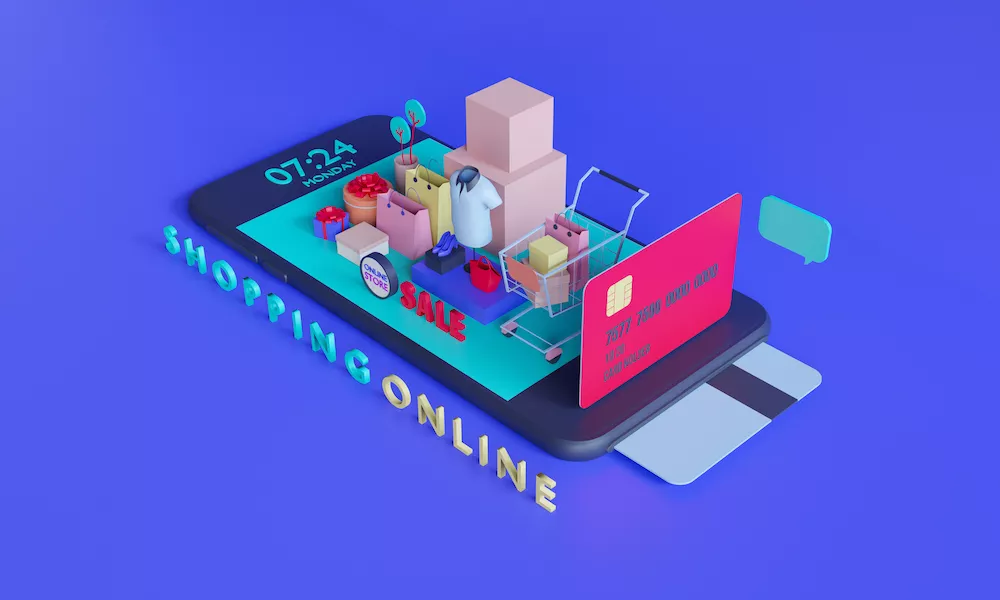Marketing
Top Ways To Use Social Media In Your Ecommerce Business Strategy

As an ecommerce business, having a social media strategy is essential to remain competitive and maximize your sales. Social media offers a powerful way to connect with potential customers and build relationships that lead to conversions.
Do you want to know how to incorporate social media marketing into your ecommerce business strategy? Read on for our top ways to incorporate social media into your ecommerce business marketing plan.
Identify Your Target Audience
Understanding and identifying your target audience is crucial to incorporating social media strategies into your ecommerce business plan. An effective process begins with a comprehensive analysis of your potential customers’ demographics, preferences, and behaviors.
By leveraging the powerful tools and insights that popular social media platforms such as Facebook, Instagram, and LinkedIn offer, you can acquire valuable information about your ideal customer profiles. This data-driven approach enables you to design and execute more engaging and personalized marketing campaigns, resulting in higher conversion rates and increased customer satisfaction.
Maintaining a solid online presence and fostering genuine connections with your audience will solidify brand loyalty and position your ecommerce business as a trusted and reputable player.
Choose the Right Platforms
A key aspect to consider when formulating ecommerce strategies is selecting the appropriate platforms tailored to your target audience and business objectives. By considering demographics, user behavior, and platform features, you can make informed decisions that focus your attention and resources on the most impactful channels.
Each platform offers distinct opportunities to showcase your products, create engaging content, and foster an active community surrounding your brand. By leveraging each platform’s unique strengths, you can ensure that your message reaches your target customers effectively while maximizing your return on investment in social media marketing.
Engage With Your Followers
Interacting with your audience through social media platforms allows you to build a more personal connection beyond transactional relationships. Paying attention to their questions, comments, and concerns helps you understand their needs and fosters a sense of community that encourages ongoing patronage.
Moreover, actively engaging with your followers allows you to showcase your brand’s personality and values to a broader audience, generating interest and fostering brand loyalty. By incorporating these strategies, you can transform your ecommerce venture into a more humanized and captivating online experience for your customers.
Create Unique Content
Producing high-quality, professional, and informative materials tailored to your target audience enhances the user experience and strengthens brand awareness and loyalty. These creative assets are powerful tools for driving traffic to your online store and generating valuable leads.
Furthermore, sharing this exclusive content across social media platforms enables you to reach a broader audience and foster meaningful connections, ultimately driving your ecommerce business to greater heights.
Utilize Paid Ads
Another critical technique for expanding your digital marketing toolkit is to utilize paid ads on platforms such as Facebook, Instagram, and LinkedIn. By harnessing the power of these channels, businesses can significantly boost brand awareness and drive targeted traffic to their online stores.
Fully customizable in terms of ad creatives, audience targeting options, and budget, paid ad campaigns to enable ecommerce companies to engage with potential customers in a way that aligns with their brand values and advertising goals.
As a result, harnessing the paid advertising capabilities offered by social media platforms can deliver impressive results and substantially grow your business’s online presence.
Run Contests & Giveaways
Running contests and giveaways is one proven way to effectively engage your target audience while boosting your online presence. Launching a contest or giveaway on platforms like Facebook, Instagram, and Twitter generates excitement and anticipation among consumers and encourages increased interaction and sharing of your business’s content.
When executed correctly, these events can promote brand awareness, drive new audiences to your ecommerce site, and increase your overall customer base. Simultaneously, customers participating in your social media contests can often become brand ambassadors, providing valuable word-of-mouth marketing essential for a thriving ecommerce platform.
Integrating timely, relevant, and engaging contests and giveaways as part of your social media strategy can result in exponential business growth and long-lasting customer relationships.
Promote Product Launches & Special Offers
Promoting product launches and special offers captures the attention of potential buyers, encourages customer engagement, and fosters a sense of urgency. By utilizing eye-catching visuals, tailored content, and targeted ads, you can seamlessly reach your audience and showcase the unique features of your products or the exceptional value of your deals.
Furthermore, the versatility of social media allows for real-time interaction with your customers, providing an ideal opportunity for gathering feedback, resolving queries, and strengthening your brand reputation. Emphasizing product launches and special offers in your social media strategy can create a more dynamic and profitable ecommerce business.
Leverage User-Generated Content (UGC)
In today’s digital world, leveraging user-generated content (UGC) has become essential to strengthen your ecommerce business strategy. By incorporating social media strategies that encourage your customers’ participation, you improve your online presence and create a sense of community and trust among your target audience.
UGC has significantly influenced purchasing decisions, such as product reviews or testimonials, images of customers using your products or services, and even referring new customers through social shares.
Here are some tips for getting started with UGC for your business.
1. Know What You Want
Before collecting UGC, you must identify what you want to achieve. Are you looking to increase engagement, build brand awareness, or showcase your products in action? Once you know your goals, you can tailor your UGC strategy accordingly.
2. Know Where You Want To Be
You can collect UGC from various platforms, including social media, email, and your website. Choose a platform that makes sense for your business and your goals.
3. Let Your Audience Participate
Once you’ve chosen your platform, it’s time to start encouraging your audience to participate. You can do this by running a contest or giveaway, asking for feedback or reviews, or simply asking your audience to share their experiences with your product or service.
4. Use It In Marketing
Once you’ve collected UGC, using it in your marketing is essential. You can share UGC on your social media, website, and email marketing campaigns. This helps to build social proof and increase engagement.
5. Give Credit Where It’s Due
When you use UGC, it’s essential to give credit to the person who created it. This can be as simple as tagging them on social media or including their name in your marketing materials.
By showcasing this authentic content on your ecommerce website and social channels, you efficiently utilize your customers as your brand advocates, leading to higher conversion rates and more robust and long-lasting relationships.
Furthermore, incorporating social proof in your UGC helps highlight your commitment to providing excellent customer experiences, fostering loyalty, and increasing your brand’s credibility. Investing time and resources in nurturing a robust user-generated content strategy can result in tremendous growth for your ecommerce business.
Incorporate Influencers & Brand Advocates Into Your Strategy
Harnessing the power of influencers and brand advocates is one approach that can significantly amplify your brand’s message and effectively establish meaningful connections with your target audience.
These influencers and advocates are relatable and trustworthy and offer a unique capacity to shape consumer preferences, drive purchasing decisions, and increase brand awareness. Now for our tips for effectively reaching out to influencers.
1. Identify Relevant Influencers
The first step is to identify influencers who align with your brand and have an audience interested in your product or service. You can use tools like BuzzSumo, Followerwonk, and Hootsuite to find influencers in your industry.
2. Personalize Your Outreach
Don’t send a generic message to every influencer you want to work with. Instead, take the time to research the influencer’s content and brand and tailor your outreach to their interests and values.
3. Offer Value
Influencers are more likely to work with you if you can offer them something of value. This could be a free product, an exclusive discount code for their followers, or even a commission on sales generated through their promotion.
4. Be Clear About Expectations
When you reach out to an influencer, be clear about what you’re asking for and what you can offer in return. This could include the type of content you want them to create, the timeline for the campaign, and any compensation you’re offering.
5. Follow Up
Don’t be afraid to follow up with influencers if you don’t hear back from them. Remind them of your initial outreach and reiterate your interest in working together.
By developing strategic partnerships with these prominent figures, businesses can unleash the true potential of their products and services while creating an ecosystem that fosters loyalty and promotes a sense of belonging.
Essentially, aligning your ecommerce business with the right influencers and advocates can cultivate a symbiotic relationship that bolsters your brand’s market presence and ultimately drives growth and profitability.
Monitor Results & Make Adjustments as Necessary
Our final aspect of a successful social media plan is consistently monitoring results and making necessary adjustments to optimize performance. Entrepreneurs can gather valuable insights into customer behavior, preferences, and trends by utilizing analytics tools designed for various social media platforms.
This data-driven approach allows businesses to fine-tune their content, promotions, and audience targeting, resulting in a more effective and impactful social media presence.
Moreover, staying informed about ever-evolving algorithms, industry best practices, and competitors’ activities enables ecommerce companies to adapt their social media strategies, ensuring they remain ahead of the curve and continuously meet their marketing objectives.
Final Thoughts
A well-thought-out social media strategy can be incredibly beneficial for driving sales and increasing brand recognition among ecommerce businesses – all while helping build relationships with potential customers along the way!
By understanding their target audience and using strategies such as creating unique content or utilizing paid ads appropriately, businesses can optimize their presence across various channels to reap maximum rewards from their efforts over time! And don’t forget – stay consistent in updating these strategies as necessary!










